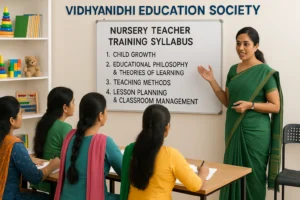
Source: pubpub
Early Childhood Care and Education Course is a lucrative program that trains aspirants to teach and nurture young children. It is a program that provides qualification, certification, and training in child development. The ECCEd Course Fees are quoted depending on the institute, course duration, and additional training materials provided.
Private institutes charge fees at a higher rate to cover the cost of additional facilities, while Government-registered institutes are cost-effective. Aspirants are provided with flexible payment options like instalment and online facilities. Allowing aspiring educators to pursue their goals in early childhood education without any constraints.
For more details of ECCE Course Call / Whatsapp +919869546913 / +919869866277
To Download Brochure of ECCE Course, Click Here!
What is the Average Range of ECCEd Course Fees?
The ECCEd fees can vary based on several factors, influencing the overall cost for aspiring educators. While there is no fixed fee structure, certain aspects determine the average range, like location, institute, course content, duration, and other facilities. Accurate research on institutes offering the best training, in-depth curriculum, and internship opportunities is beneficial.
Here is the deep analysis of factors affecting ECCEd Course Fees:
Variation by Location
Well-established training centers in metropolitan areas may have higher fees compared to institutions in smaller towns. The fees for an ECCEd course can differ based on the city or state where the institute is located.
Course Duration and Content
Programs that offer extensive training, additional workshops, and practical learning components may have a higher fee range. Short-term certification courses generally cost less compared to full-year diploma programs.
Government vs. Private Institutions
Government-registered course and training centers often offer an inexpensive fee structure, providing affordability with quality education. Whereas, private institutions might charge higher fees due to additional facilities, experienced faculty, and international teaching practices.

Source: suraasa
Why is there a Difference between Online and Regular Class ECCEd Course?
The Early Childhood Care and Education Course provides online and offline learning options to address the different learning requirements of aspirants. Both of these approach aims to provide thorough knowledge of early education and advanced teaching techniques.
Key Differences Between Online and Regular Classroom ECCEd Courses
Online ECCEd Course
Self-Learning – It allows participants to complete the course at their own pace and access the course material multiple times.
Digital Collaboration – Flexibility – Online learning is suitable for working professionals, mothers, and students to conveniently pursue this course through pre-recorded lectures from anywhere and anytime.
Saves Time and Money– Digital learning eliminates traveling, which saves time and money.
Aspects of Regular Classroom
Direct Interaction – Enrollees attend offline lectures and receive learning experiences directly from trainers.
Structured Learning Environment – Regular batches are fixed and are to be attended at a specific time.
Hands-on Activities – Aspirants get opportunities to apply their theoretical knowledge through practical practices through projects.
The difference between the online and regular class ECCEd Course is inconsequential. The quality of training is never comprised and provides same curriculum in both the learning options. ECCEd is a gratifying program to be considered, even with a 12th of education, it is a great option to restart a career for mothers and other professionals.

Source: ismaili
What is the Scope ECCEd Course?
Early Childhood Care and Education is a professional program that provides aspirants with training in child development, child psychology, and teaching practices. The mounting demand for proficient professionals in early education increases the scope of ECCEd Courses to a great extent. Aspirants holding certification in ECCED explore the plethora of job opportunities with flexibility in working hours and personal growth.
The Scope ECCEd Course is vast and filled with exciting positions in teaching:
Preschool Teacher
Teaches children aged 2–6 years using play-based and interactive learning. They organize activities and foster social and cognitive skills.
Childcare Specialist/ Special Educator
Works with children having learning disabilities, autism, or developmental delays. Uses adaptive teaching techniques to meet individual needs.
Trainer
Conducts workshops and training for aspiring preschool teachers. Helps improve teaching methodologies and classroom management.
Early Childhood Educator
Daycare Center Supervisor
Supervises and provides one-on-one care to children at home or daycare centers. Engages children in learning and play activities. Suitable for those who prefer informal settings over schools.
Curriculum Creator
Designs age-appropriate learning materials and activities. Aligns preschool curriculum with educational standards.
Preschool Owner
Establishes and runs a private preschool or daycare. Manages staff, curriculum, and business operations. It requires investment and experience of preschool management.
Educational Consultant
Advises preschools on curriculum development, teacher training, and infrastructure. Helps improve school standards and learning outcomes.
The significance of early childhood education is increasing, and parents are enthusiastic to provide the best early learning to children. This has increased the surge of trained educators and early childcare teachers.
What is the ECCE Course Used for?
An Early Childhood Care and Education Course – ECCE is used to shape the early years of a child’s life. It offers a structured learning and growing environment that fosters the developing years of young children. Trained educators create an engaging classroom following ECCE patterns to enhance holistic development.
Here are the areas where ECCE is applied for complete development:
Holistic Development
ECCE is used to develop holistic progress in young children. It sets the foundation of basic learning and provides an atmosphere to attain overall growth.
School Transition
ECCE is a foundational learning program, and it prepares children for the primary transition by equipping them with initial academic learning knowledge.
Emotional & Social Growth
Helps children build positive relationships, develop empathy, show respect, and respond effectively to their feelings.
Intervention of Early Learning Challenges
With ECCE, parents and teachers identify the early learning disabilities of children that might hinder their academic success. By applying appropriate teaching methods, these challenges can be overcome.
Constructive Influence on Community
EECE has an influential impact on society. It provides quality training to teachers, enhanced learning experiences to children, and structured parenting to parents.
With structured training and practical learning methods, an Early Childhood Care and Education Course helps educators create meaningful learning experiences that shape a child’s future. Vidhyanidhi Education Society (Govt. Regd.) offers the Early Childhood Care and Education Course that offers an innovative combination of theoretical knowledge and practical experiences.
Join ECCE Course at Vidhyanidhi Education Society, shape young minds and enrol today!
For more details of ECCE Course Call / Whatsapp +919869546913 / +919869866277
To Download Brochure of ECCE Course, Click Here!
FAQs
How long is the ECCE Diploma?
The ECCE Diploma is typically of 1 year, depending on the institute and course structure, with options for online and offline learning.
Is ECCE a Good Course?
Yes, ECCE is a valuable course for those passionate about early education, offering career opportunities in preschools, day-care centres, and child development fields.
Can I do ECCE After 12th?
Yes, ECCE can be pursued after the 12th from a recognized board. Vidhyanidhi Education Society offers this course with flexible learning options for aspiring early childhood educators.



